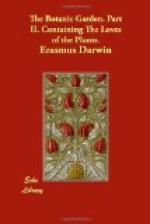Eight
watchful swains along the lawns of night
With
amorous steps pursue the virgin light;
O’er
her fair form the electric lustre plays,
50 And cold she moves amid the lambent blaze.
So
shines the glow-fly, when the sun retires,
And
gems the night-air with phosphoric fires;
[So shines the glow-fly. l. 52. In Jamaica, in some seasons of the year, the fire-flies are seen in the evenings in great abundance. When they settle on the ground, the bull-frog greedily devours them; which seems to have given origin to a curious, though cruel, method of destroying these animals: if red-hot pieces of charcoal be thrown towards them in the dusk of the evening, they leap at them, and, hastily swallowing them, are burnt to death.]
Thus
o’er the marsh aerial lights betray,
And
charm the unwary wanderer from his way.
55 So when thy King, Assyria, fierce and proud,
Three
human victims to his idol vow’d;
Rear’d
a vast pyre before the golden shrine
Of
sulphurous coal, and pitch-exsuding pine;—
—Loud
roar the flames, the iron nostrils breathe,
60 And the huge bellows pant and heave beneath;
Bright
and more bright the blazing deluge flows,
And
white with seven-fold heat the furnace glows.
And
now the Monarch fix’d with dread surprize
Deep
in the burning vault his dazzled eyes.
65 “Lo! Three unbound amid the frightful
glare,
Unscorch’d
their sandals, and unsing’d their hair!
And
now a fourth with seraph-beauty bright
Descends,
accosts them, and outshines the light!
Fierce
flames innocuous, as they step, retire!
70 And slow they move amid a world of fire!”
He
spoke,—to Heaven his arms repentant spread,
And
kneeling bow’d his gem-incircled head.
Two
Sister-Nymphs, the fair AVENAS, lead
Their
fleecy squadrons on the lawns of Tweed;
75 Pass with light step his wave-worn banks along,
And
wake his Echoes with their silver tongue;
Or
touch the reed, as gentle Love inspires,
In
notes accordant to their chaste desires.




